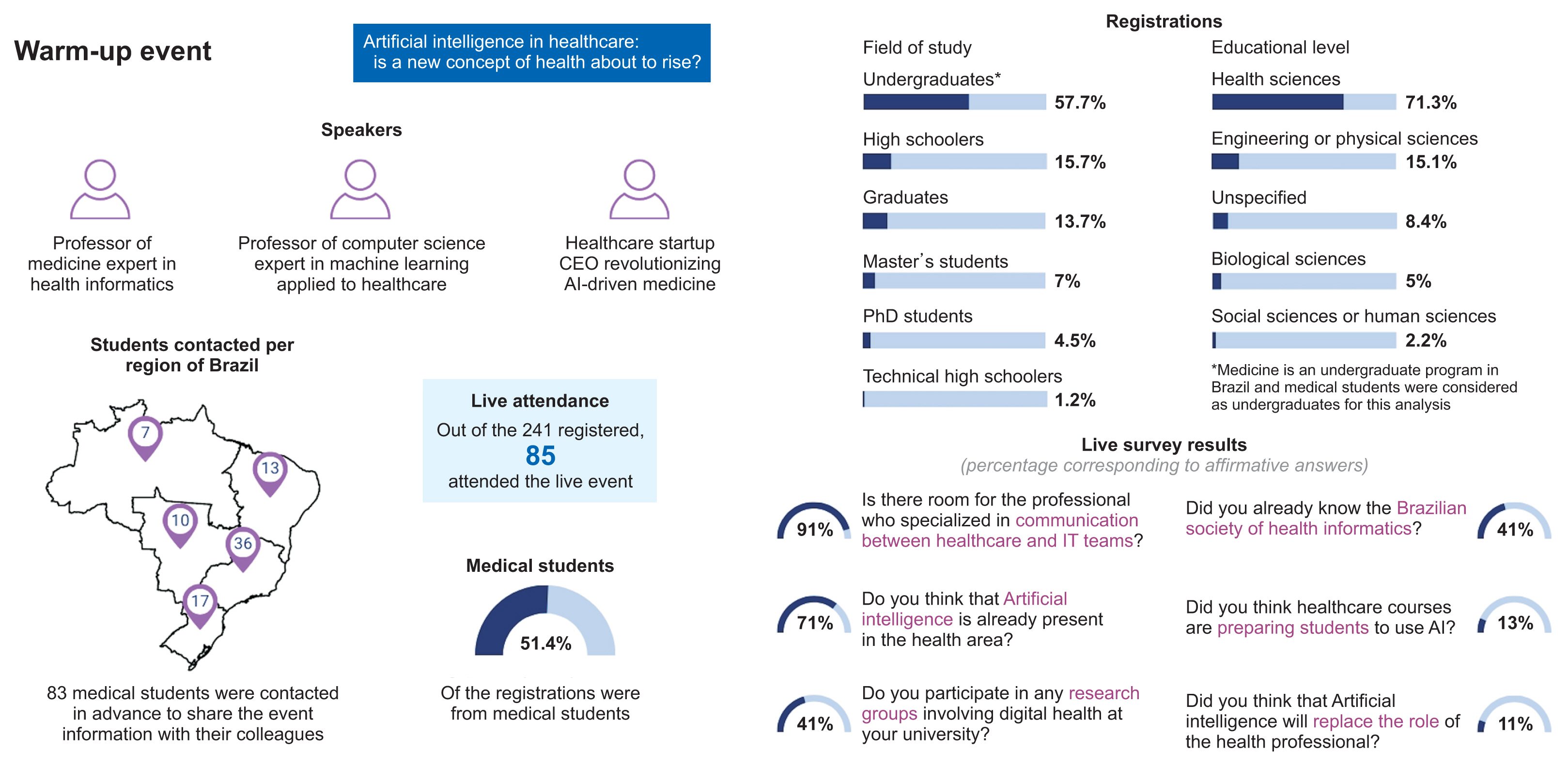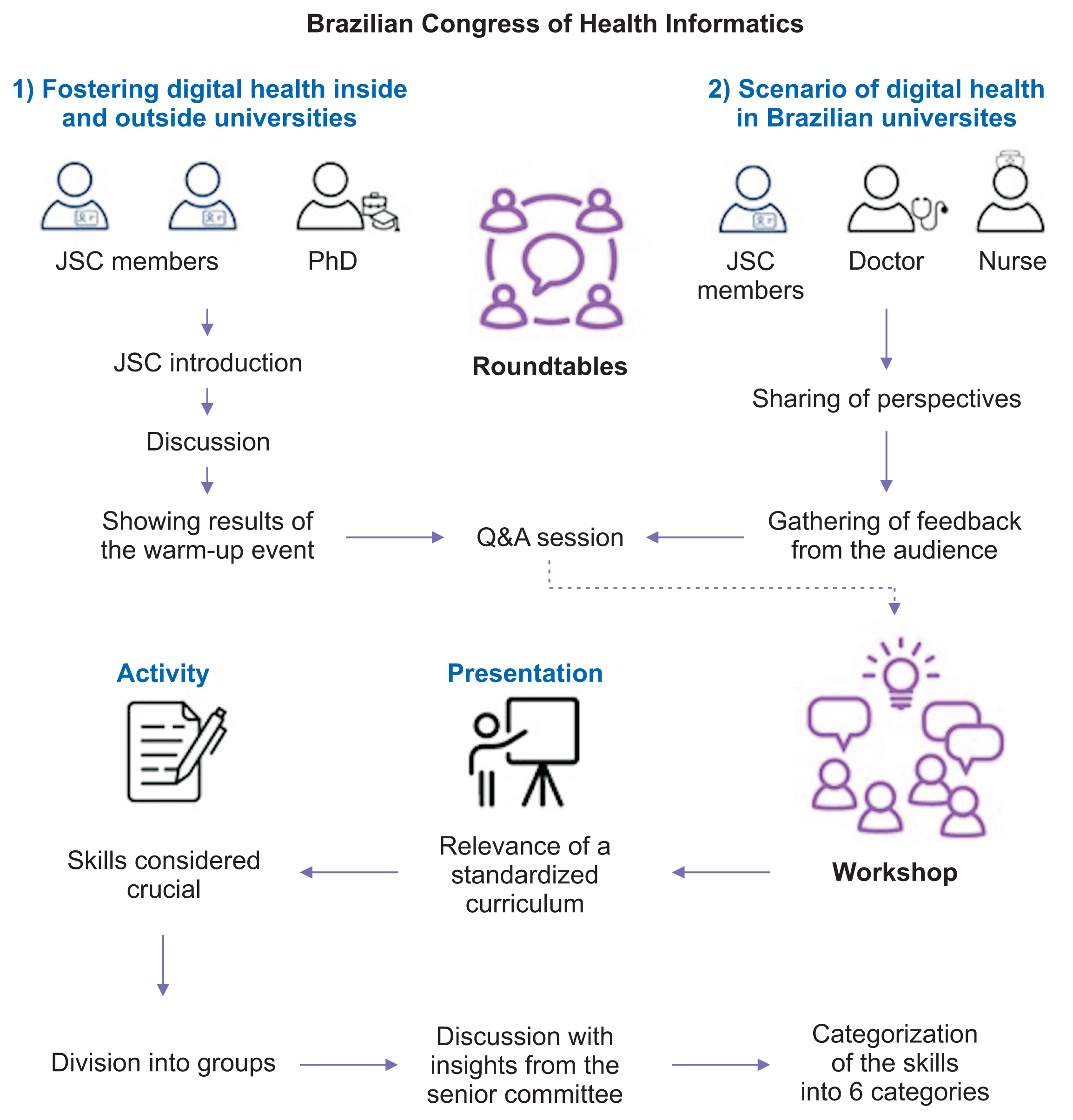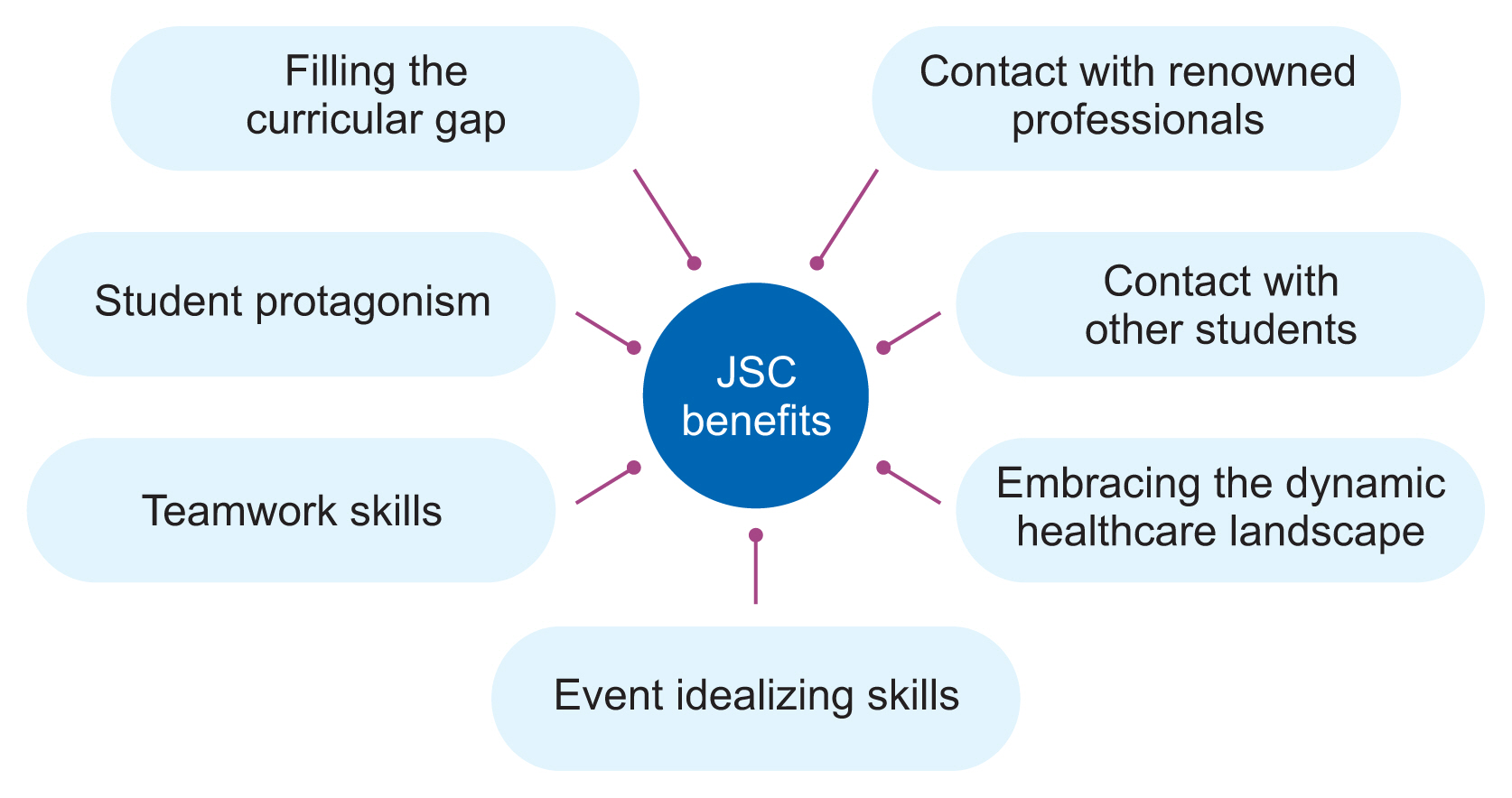 |
 |
- Search
| Healthc Inform Res > Volume 30(1); 2024 > Article |
|
Abstract
Objectives
Digital health (DH) is a revolution driven by digital technologies to improve health. Despite the importance of DH, curricular updates in healthcare university programs are scarce, and DH remains undervalued. Therefore, this report describes the first Junior Scientific Committee (JSC) focusing on DH at a nationwide congress, with the aim of affirming its importance for promoting DH in universities.
Methods
The scientific committee of the Brazilian Congress of Health Informatics (CBIS) extended invitations to students engaged in health-related fields, who were tasked with organizing a warm-up event and a 4-hour session at CBIS. Additionally, they were encouraged to take an active role in a workshop alongside distinguished experts to map out the current state of DH in Brazil.
Results
The warm-up event focused on the topic “Artificial intelligence in healthcare: is a new concept of health about to arise?” and featured remote discussions by three professionals from diverse disciplines. At CBIS, the JSC’s inaugural presentation concentrated on delineating the present state of DH education in Brazil, while the second presentation offered strategies to advance DH, incorporating viewpoints from within and beyond the academic sphere. During the workshop, participants deliberated on the most crucial competencies for future professionals in the DH domain.
Digital health (DH) encompasses the application of digital technologies to improve health [1]. The integration of those tools has revolutionized medical practice [2]; nonetheless, healthcare university programs have overlooked the crucial issue of incorporating DH education into the curriculum. Thus, future professionals are not adequately prepared to leverage these tools, despite the increasing need for graduates qualified in health informatics [3].
Recognizing this issue, the Brazilian Ministry of Health has acknowledged the importance of DH education in the Brazilian National Digital Health Strategy 2020–2028 [4]. This initiative aims to enhance healthcare delivery, improve patient outcomes, and promote data interoperability through the integration of DH technologies. However, the successful implementation of this strategy hinges on making changes within undergraduate and graduate programs, involving updates to curricula and training for faculty members.
To bridge this educational gap, the scientific committee of the Brazilian Congress of Health Informatics (CBIS) created a Junior Scientific Committee (JSC) for the CBIS conference. The main objective of this study is to describe the experience of the JSC at the CBIS and to affirm its importance for promoting DH among students.
Brazilian students from various regions and academic disciplines, all with notable experience in promoting DH, were invited to collaborate from June to December 2022. All nine students accepted the invitation, comprising five males and four females. The group included five medical students, two biomedical informatics undergraduates, one computer science undergraduate, and one computer scientist currently enrolled in a health sciences PhD program.
Remote meetings with a 1-hour duration were scheduled weekly, accompanied by a monthly follow-up meeting with experts from the CBIS Committee, totaling 18 meetings. The experts consisted of three renowned professionals with expertise in digital health, each with either a computational or medical background.
The JSC decided to organize a warm-up event prior to the CBIS in order to stimulate discussion on DH among students. This took the form of a remote roundtable discussion. The chosen theme for the event was “Artificial intelligence (AI) in healthcare: is a new concept of health about to arise?” To enrich the conversation, three speakers with expertise in AI were invited: a businessperson, a professor of medicine, and a professor of computer science.
To promote the event, members of the JSC reached out to Brazilian medical students via WhatsApp, sending a message accompanied by an event card. Of the 83 students from various medical schools who were contacted, 56 shared the event card in their university’s group chats, representing a 67.4% engagement rate.
Out of 241 registered participants, 85 (35.2%) attended the event live. The speakers explored ethical considerations and practical applications of AI in medical practice. Throughout the discussion, interactive online polls were conducted with the attendees to gauge their perspectives on current and potential DH scenarios, yielding an average of 41 responses per poll. Figure 1 presents an overview of the warm-up event results.
Considering the nature of this initiative, this study did not require approval from the Brazilian Ethics in Research Committee (CONEP), in accordance with Resolution 510/2016 [5]. Additionally, all responses were collected anonymously, and the study was conducted with strict adherence to Brazilian legal and ethical standards concerning data collection and sharing [5,6]. The event was hosted on a free-to-use platform, and all attendees provided their consent to the platform’s terms and conditions voluntarily. Furthermore, during the event registration process, all participants consented to the sharing of their information for scientific purposes.
The main event took place in person and spanned 3 days, each consisting of two 4-hour blocks, with several rooms hosting events simultaneously. The JSC was granted the freedom to develop the scientific schedule for an entire 4-hour block in one of the rooms. The chosen format involved splitting the block into two distinct sections, with each section featuring lectures followed by a question-and-answer period. Figure 2 provides an overview of the JSC’s involvement in the CBIS.
This section presented the current state of DH education in Brazilian universities. The speakers included a member of the JSC and a PhD student who was engaged in a project to map DH-related programs in Brazil. The session was presided over by another JSC member, who facilitated the discussion. The roles of JSC members were outlined, and findings from the warm-up event were shared. At the conclusion of the roundtable, participants engaged in a robust dialogue concerning the impact of insufficient DH initiatives within universities on student education. There was a consensus that the academic community should scrutinize this issue more thoroughly. The challenges associated with implementing these initiatives that were discussed are listed in Table 1.
For the following 2 hours, the JSC presented different perspectives and strategies to address the lack of preparation of current and future professionals for using DH in medical practice. To facilitate this discussion, three speakers were invited: a JSC member, a physician, and a nurse actively engaged in working with medical devices and DH education.
The representative from the JSC presented a student perspective, highlighting the initiatives developed within academic circles. A medical doctor recounted his dual roles as a professor in the field and as a podcaster, specifically in relation to DH, while a nurse detailed her involvement in continuing education programs designed to keep graduates updated on and trained in the latest medical technologies. Following the presentations, the JSC collected feedback from the audience, and the overwhelming response was that the lectures offered valuable insights for addressing the issue at hand in their respective settings. The initiatives that were discussed are summarized in Table 2.
At CBIS, JSC members were invited to participate in a workshop about the expected skills for an optimal DH academic curriculum. These skills were based on the International Medical Informatics Association’s latest revision of educational standards in health informatics [7].
After a presentation on the importance of a standardized curriculum for fostering DH, participants filled out a checklist indicating the skills they deemed most crucial for future DH professionals. Subsequently, the attendees were split into groups to discuss their selections and share their conclusions. One group consisted of current members of the JSC, who were actively encouraged to contribute their insights on the integration of DH within university settings during the discussions.
The CBIS committee highly valued insights from JSC members when determining the ideal healthcare curriculum, which includes the expected skills. The results from the workshop have been described elsewhere [8].
To our knowledge, this is the first JSC for a national DH event. The hallmark of the JSC was the engagement of students alongside seasoned professionals in mapping out the present landscape of DH in Brazilian healthcare initiatives. These students had the opportunity to hone the necessary skills for organizing large-scale conferences, such as the CBIS, which is the premier DH event in Latin America. The primary benefit of this strategy is that it equips the upcoming generation to take the lead on a topic that, despite being underexplored, is already significant in medical practice. The advantages of the JSC are depicted in Figure 3.
As crucial as it is to prepare current practitioners, it is equally important to equip future professionals with the necessary skills, and universities should serve as nurturing environments that disseminate knowledge and encourage initiatives in DH. However, most efforts to raise awareness about DH in healthcare programs are currently led by faculty staff, with little to no engagement from the true catalysts of this transformation—the students themselves. It is unsurprising, then, that only 14% of the students who participated in our public opinion survey felt that their health sciences programs adequately prepared them to apply artificial intelligence in healthcare. Moreover, Machleid et al. [9] revealed that 85% out of 451 European students consulted agreed that more DH subjects should be implemented in their curricula.
Although DH remains an undervalued theme, there are emerging initiatives about DH education worldwide to fill this gap. German researchers [10] described the implantation of a 3-week curricular module about DH in a medical school, and all students involved agreed that this module motivated them to study more about this topic. As DH is a broad concept involving AI, big data, robotics, and other domains, efforts have been made to identify specific topics that medical students should be familiar with [11,12]. Moreover, Echelard et al. [13] conducted a scoping review investigating current DH training for medical students, and suggested that the broad concept of DH should be studied at the same time as more specific subjects such as programming. To address this issue, the CBIS workshop gathered the most important skills expected of professionals involved with DH, facilitating the formation of a standardized curriculum, as has also been done in other initiatives worldwide [14–19].
This study has some limitations. It represents a pioneering initiative from Brazil, which necessitates validation in various other contexts. Additionally, we did not systematically evaluate the satisfaction levels of the students, experts, and audience involved with the CBIS initiative.
The establishment of a JSC during a national DH event was deemed a valuable endeavor to promote DH. This strategy is important not only on a national level, but we also believe that it will inspire new initiatives at universities. Encouraging students to take an active role in organizing events such as the CBIS allows them to engage confidently with the evolving healthcare sector and benefit from the stimulating atmosphere generated by the collaboration between students and distinguished experts.
Acknowledgments
We thank the Brazilian Society of Health Informatics for all the support that made this study possible.
Figure 1
Infographic of the warm-up event at the Brazilian Congress of Health Informatics (CBIS) 2022.

Figure 2
Junior Scientific Committee participation in the Brazilian Congress of Health Informatics (CBIS) 2022.

Table 1
Challenges discussed at CBIS 2022 regarding the implementation of strategies to promote digital health in universities
Table 2
Initiatives discussed at CBIS 2022 by speakers from inside and outside academia to prepare current and future professionals for the use of digital health in medical practice
References
1. World Health Organization. WHO guideline: recommendations on digital interventions for health system strengthening [Internet]. Geneva, Switzerland: World Health Organization; 2019 [cited at 2024 Jan 30]. Available from: https://apps.who.int/iris/handle/10665/311941
2. Thapa S, Nielsen JB, Aldahmash AM, Qadri FR, Leppin A. Willingness to use digital health tools in patient care among health care professionals and students at a university hospital in Saudi Arabia: quantitative cross-sectional survey. JMIR Med Educ 2021 7(1):e18590.https://doi.org/10.2196/18590



3. Alzghaibi H. The gap between bachelor’s degree graduates in health informatics and employer needs in Saudi Arabia. BMC Med Educ 2023 23(1):475.https://doi.org/10.1186/s12909-023-04442-7



4. Ministry of Health. Brazilian National Digital Health Strategy 2020–2028. [Internet]. Brasilia, Brazil: SUS IT Department, Ministry of Health; 2020 [cited at 2024 Jan 30]. Available from: http://bvsms.saude.gov.br/bvs/publicacoes/estrategia_saude_digital_Brasil.pdf
5. National Research Ethics Commission (Comissao Nacional de Etica em Pesquisa). National Health Council (CNS) Resolution no 510/2016 [Internet]. Brasilia, Brazil: National Research Ethics Commission; 2016 [cited at 2024 Jan 30]. Available from: https://conselho.saude.gov.br/resolucoes/2016/Reso510.pdf
6. Ministry of Health. General Data Protection Law (LGPD) [Internet]. Brasilia, Brazil: Ministry of Health; 2019 [cited at 2024 Jan 30]. Available from: https://www.planalto.gov.br/ccivil_03/_ato2019-2022/2019/lei/l13853.htm
7. Bichel-Findlay J, Koch S, Mantas J, Abdul SS, Al-Shorbaji N, Ammenwerth E, et al. Recommendations of the International Medical Informatics Association (IMIA) on Education in Biomedical and Health Informatics: second revision. Int J Med Inform 2023 170:104908.https://doi.org/10.1016/j.ijmedinf.2022.104908


8. Gaspar JD, Motta RA, Marin HD. Digital health competencies: results from the first workshop promoted by SBIS-CBIS2022 [Internet]. Campinas, Brazil: Brazilian Society of Health Informatics (SBIS); 2023 [cited at 2024 Jan 11]. Available from: https://zenodo.org/records/7855562
9. Machleid F, Kaczmarczyk R, Johann D, Balciunas J, Atienza-Carbonell B, von Maltzahn F, et al. Perceptions of digital health education among European medical students: mixed methods survey. J Med Internet Res 2020 22(8):e19827.https://doi.org/10.2196/19827



10. Rohrig R, Stausberg J, Dugas M. Development of national competency-based learning objectives “Medical Informatics” for undergraduate medical education. Methods Inf Med 2013 52(3):184-8. https://doi.org/10.3414/ME13-04-0001


11. McCoy LG, Nagaraj S, Morgado F, Harish V, Das S, Celi LA. What do medical students actually need to know about artificial intelligence? NPJ Digit Med 2020 3:86.https://doi.org/10.1038/s41746-020-0294-7



12. Jimenez G, Spinazze P, Matchar D, Koh Choon Huat G, van der Kleij RM, Chavannes NH, et al. Digital health competencies for primary healthcare professionals: a scoping review. Int J Med Inform 2020 143:104260.https://doi.org/10.1016/j.ijmedinf.2020.104260


13. Echelard JF, Methot F, Nguyen HA, Pomey MP. Medical student training in ehealth: scoping review. JMIR Med Educ 2020 6(2):e20027.https://doi.org/10.2196/20027



14. Khairat S, Feldman SS, Rana A, Faysel M, Purkayastha S, Scotch M, et al. Foundational domains and competencies for baccalaureate health informatics education. J Am Med Inform Assoc 2023 30(10):1599-607. https://doi.org/10.1093/jamia/ocad147


15. Ahonen O, Kotila J, Melender HL, Saranto K. The biomedical and health informatics recommendation domains in relation to the nurse competence scale categories. Stud Health Technol Inform 2023 305:216-9. https://doi.org/10.3233/SHTI230466


16. Poncette AS, Glauert DL, Mosch L, Braune K, Balzer F, Back DA. Undergraduate medical competencies in digital health and curricular module development: mixed methods study. J Med Internet Res 2020 22(10):e22161.https://doi.org/10.2196/22161



17. Hare AJ, Soegaard Ballester JM, Gabriel PE, Adusumalli S, Hanson CW. Training digital natives to transform healthcare: a 5-tiered approach for integrating clinical informatics into undergraduate medical education. J Am Med Inform Assoc 2022 30(1):139-43. https://doi.org/10.1093/jamia/ocac209



18. Bellazzi R, Cecconi M, Costantino ML, Veltri P. Bioengineering and medical informatics education in MD programs: perspectives from three Italian experiences. Int J Med Inform 2023 172:105002.https://doi.org/10.1016/j.ijmedinf.2023.105002


19. Quach WT, Le CH, Clark MG, McArthur E, Ancker JS, Gadd CS, et al. Engaging the next generation of physician-informaticians through early exposure to the field: successes and challenges associated with starting a novel clinical informatics interest group. J Am Med Inform Assoc 2022 30(1):202-5. https://doi.org/10.1093/jamia/ocac189



- TOOLS








